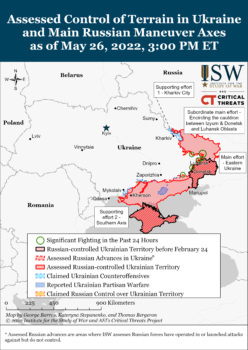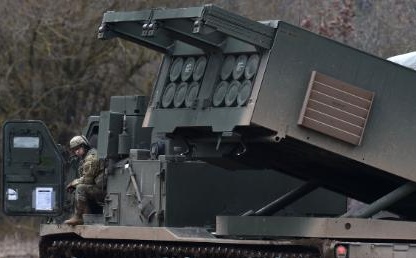Photo: Christof Stache/AFP/Getty
Saturday’s Coverage: Russia “Responsible For Direct and Public Incitement to Commit Genocide”

Source: Institute for the Study of War
UPDATE 1439 GMT:
Ukraine President Volodymyr Zelenskiy, in his first appearance outside the Kyiv region since the Russian invasion on February 24, has visited troops in Kharkiv.
Zelenskiy told the soldiers, “You risk your lives for us all and for our country.
President Zelensky visited Ukrainian forces in the Kharkiv region #Ukraine pic.twitter.com/Yg1jma7EW7
— Michael A. Horowitz (@michaelh992) May 29, 2022
UPDATE 1032 GMT:
Russia’s offensive in the Luhansk region in eastern Ukraine has killed two civilians and destroyed another 60 houses.
Governor Serhiy Haidai said one of the victims was a girl who was slain when a Russian shell hit a high-rise building in Lysychansk on Saturday, in a strike that injured four other people. A cinema and 22 houses were also damaged in an airstrike.
UPDATE 0759 GMT:
A Russian proxy official in the occupied Kherson region in southern region has backed off a threat of Russian annexation.
Kirill Stremousov, the deputy head of the Russian proxy administration, said the region will not hold a “referendum” on annexation until fighting ceases in the area and in the nearby regions of Odesa and Mykolaiv.
While occupying Kherson in the early days of their invasion, Russian forces have not been able to seize Mykolaiv or to advance on Odesa, at the western end of the coastal corridor along the Black Sea.
UPDATE 0728 GMT:
Russian shelling has killed at least one person and injured six in Mykolaiv in southern Ukraine. Two rounds landed in courtyards of high-rise buildings, and one shell fell close to a kindergarten.
UPDATE 0713 GMT:
The Ukraine Government says at least 242 children have been killed and 440 wounded during the Russian invasion.
Like the UN, which has similar numbers, the Government says the actual number is far higher because it is difficult to confirm casualties in areas of fighting.
UPDATE 0652 GMT:
Nazar Rozlutsky, a historian who is now a sergeant in the Ukraine Army, has posted a moving riposte to those — including the editors of the New York Times and former US Secretary of State Henry Kissinger — who have said Ukrainians should accept Russian occupation of part of their country.
We don’t need suggestions to surrender. If you are not ready to fight with us against the said enemy, then help us with weapons, money, sanctions. We need a lot of things to defeat Russia and thus sharply reduce the level of the global crisis.
But we have the main thing — motivation. We have historians willing to sleep on drawers of five people in two bedrooms and for weeks muck without being able to wash. We have accountants ready to eat only porridge with stew for months. We have young students living their best years under threat of death. And they won’t go anywhere – unless they all get killed.
Ukraine will fight either to victory or until it can resist [Russian occupation].
And what will you do?
And Yegor Firsov, a former MP who is now an army medic, writes in The New York Times:
I was ready for the lack of electricity, water and poor cellphone service on the front line. What I did not expect is how much stronger the sense of life would become in the constant presence of death….
You might think that people are tougher in places where death is commonplace, but I’ve found that people are more sensitive and more open. When shells are exploding everywhere and you are lying in cover with strangers, you really feel like having frank conversations. You share intimate secrets, personal experiences and sacred memories. People want to fill death-ravaged space with as much life as possible.
UPDATE 0647 GMT:
Ukraine President Volodymyr Zelenskiy has ruled out a counter-offensive to regain all the territory occupied by Russia since 2014, including the Crimea peninsula in the south.
“I do not believe that we can restore all of our territory by military means. If we decide to go that way, we will lose hundreds of thousands of people,” Zelenskiy said.
ORIGINAL ENTRY: Facing Russia’s attempt to seize territory in eastern Ukraine, Kyiv’s leaders have appealed to Western countries to deliver long-range rocket systems that could check Vladimir Putin’s last-chance offensive.
In the past two weeks, Russian forces have finally made advances in the Donbas despite the problems with supply, logistics, command, and morale that led to failure outside southern Ukraine in the invasions’ first three months.
The offensive has surrounded most of Sievierodonetsk and Lysychansk, the largest Ukraine-controlled cities in the Luhansk oblast, and it occupied Lyman, a railway hub in neighboring Donetsk.
Ukraine President Volodymyr Zelenskiy said in his nightly video address to the nation that conditions in Donbas are “indescribably difficult”, thanking Ukrainian defenders for their resistance against the mass of Russian forces and shelling that has levelled towns and cities.
This is primarily the supply of weapons. Every day we are bringing closer the time when we will surpass the enemy technologically and by firepower.
Of course, a lot depends on the partners, on their readiness to provide Ukraine with everything necessary to defend freedom.
And I expect good news on this next week.
Ukraine’s commander-in-chief, Gen. Valeriy Zaluzhnyi, explained, “We are in great need of weapons that will make it possible to engage the enemy over a long distance. The price of delay is measured by the lives of people who have protected the world from fascism.”
Zelenskiy advisor Mykhailo Podolyak posted on Twitter:
If the West really wants 🇺🇦’s victory, maybe it is time to give us long-range MLRS? It is hard to fight when you are attacked from a 70 km distance and have nothing to fight back with. 🇺🇦 can bring 🇷🇺 back behind the Iron Curtain, but we need effective weapons for that. Here&Now.
— Михайло Подоляк (@Podolyak_M) May 28, 2022
Awaiting The MLRSs
Ukrainian officials say the mobile multiple launch rocket systems are vital in halting Russia’s onslaught. The MLRSs can Russian firing positions, military bases, airstrips and supply lines up to 300km (185 miles) away.
However, the Biden Administration has been embroiled in debate over the provision of the systems. Some advisors worry that Ukraine could strikes targets inside Russia.
US media reported on Saturday that President oe Biden will include MLRSs in new US arms package next week, which will also include the HIMARS high mobility artillery rocket system.
Ukraine Foreign Minister Dmytro Kuleba said talks with US Secretary of State Antony Blinken, “Heavy weapons on top of our agenda, and more are coming our way.”
The UK is expected to follow any US provision with the delivery of its own MLRSs, which can fire 12 missiles in less than a minute at a range of 84km (52 miles).
Russian officials tipped off their concern. “If the Americans do this, they will clearly cross a red line,” said Olga Skabeeva, a high-profile State TV host, asserting that the Kremlin’s response could be “very harsh”.
Macron and Scholz Speak with Putin
French President Emmanuel Macron and German Chancellor Olaf Scholz spoke with Vladimir Putin for 80 minutes on Saturday, urging the Russian to hold “direct serious negotiations” with President Zelenskiy with an “immediate ceasefire and a withdrawal of Russian troops”.
Putin showed no sign of heeding the appeal. Instead, he asserted that supplying arms to Ukraine is “dangerous” with “the risks of further destabilization of the situation and aggravation of the humanitarian crisis”.
Putin tried to deflect Macron and Scholz’s concerns about a Russian blockade of Ukrainian ports that is threatening a global food crisis, adding to the food deprivation of tens of millions of people. He said he is willing to discuss the possibility of resumed shipments of grain from the Black Sea ports.

